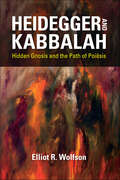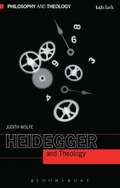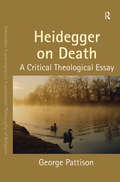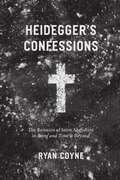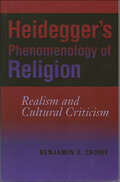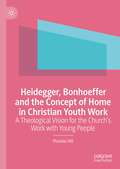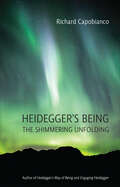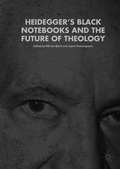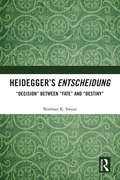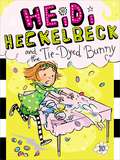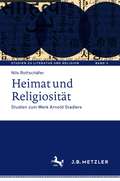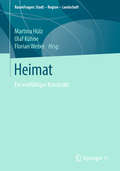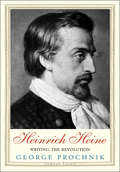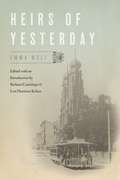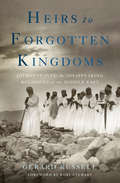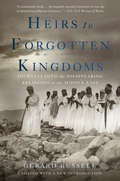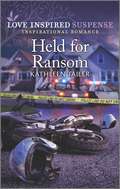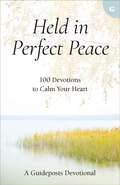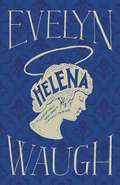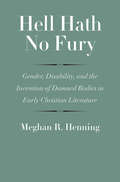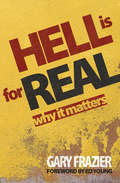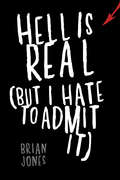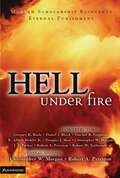- Table View
- List View
Heidegger and Kabbalah: Hidden Gnosis and the Path of Poiesis (New Jewish Philosophy and Thought)
by Elliot R. WolfsonWhile many scholars have noted Martin Heidegger's indebtedness to Christian mystical sources, as well as his affinity with Taoism and Buddhism, Elliot R. Wolfson expands connections between Heidegger's thought and kabbalistic material. By arguing that the Jewish esoteric tradition impacted Heidegger, Wolfson presents an alternative way of understanding the history of Western philosophy. Wolfson's comparison between Heidegger and kabbalah sheds light on key concepts such as hermeneutics, temporality, language, and being and nothingness, while yielding surprising reflections on their common philosophical ground. Given Heidegger's involvement with National Socialism and his use of antisemitic language, these innovative readings are all the more remarkable for their juxtaposition of incongruent fields of discourse. Wolfson's entanglement with Heidegger and kabbalah not only enhances understandings of both but, more profoundly, serves as an ethical corrective to their respective ethnocentrism and essentialism. Wolfson masterfully illustrates the redemptive capacity of thought to illuminate common ground in seemingly disparate philosophical traditions.
Heidegger and Theology (Philosophy and Theology)
by Judith Wolfe Laurence Hemming<p>Martin Heidegger is the 20th century theology philosopher with the greatest importance to theology. A cradle Catholic originally intended for the priesthood, Heidegger's studies in philosophy led him to turn first to Protestantism and then to an atheistic philosophical method. Nevertheless, his writings remained deeply indebted to theological themes and sources, and the question of the nature of his relationship with theology has been a subject of discussion ever since. <p>This book offers theologians and philosophers alike a clear account of the directions and the potential of this debate. It explains Heidegger's key ideas, describes their development and analyses the role of theology in his major writings, including his lectures during the National Socialist era. It reviews the reception of Heidegger's thought both by theologians in his own day (particularly in Barth and his school as well as neo-Scholasticism) and more recently (particularly in French phenomenology), and concludes by offering directions for theology's possible future engagement with Heidegger's work.</p>
Heidegger on Death: A Critical Theological Essay (Intensities: Contemporary Continental Philosophy of Religion)
by George PattisonThis book examines the question of death in the light of Heidegger's paradigmatic discussion in Being and Time. Although Heidegger's own treatment deliberately refrains from engaging theological perspectives, George Pattison suggests that these not only serve to bring out problematic elements in his own approach but also point to the larger human or anthropological issues in play. Pattison reveals where and how Heidegger and theology part ways but also how Heidegger can helpfully challenge theology to rethink one of its own fundamental questions: human beings' relation to their death and the meaning of death in their religious lives.
Heidegger's Confessions: The Remains of Saint Augustine in "Being and Time" and Beyond (Religion And Postmodernism Ser.)
by Ryan CoyneAlthough Martin Heidegger is nearly as notorious as Friedrich Nietzsche for embracing the death of God, the philosopher himself acknowledged that Christianity accompanied him at every stage of his career. In Heidegger's Confessions, Ryan Coyne isolates a crucially important player in this story: Saint Augustine. Uncovering the significance of Saint Augustine in Heidegger’s philosophy, he details the complex and conflicted ways in which Heidegger paradoxically sought to define himself against the Christian tradition while at the same time making use of its resources. Coyne first examines the role of Augustine in Heidegger’s early period and the development of his magnum opus, Being and Time. He then goes on to show that Heidegger owed an abiding debt to Augustine even following his own rise as a secular philosopher, tracing his early encounters with theological texts through to his late thoughts and writings. Bringing a fresh and unexpected perspective to bear on Heidegger’s profoundly influential critique of modern metaphysics, Coyne traces a larger lineage between religious and theological discourse and continental philosophy.
Heidegger's Phenomenology of Religion: Realism and Cultural Criticism (Philosophy of Religion)
by Benjamin D. CroweThroughout his long and controversial career, Martin Heidegger developed a substantial contribution to the phenomenology of religion. In Heidegger's Phenomenology of Religion, Benjamin D. Crowe examines the key concepts and developmental phases that characterized Heidegger's work. Crowe shows that Heidegger's account of the meaning and structure of religious life belongs to his larger project of exposing and criticizing the fundamental assumptions of late modern culture. He reveals Heidegger as a realist through careful readings of his views on religious attitudes and activities. Crowe challenges interpretations of Heidegger's early efforts in the phenomenology of religion and later writings on religion, including discussions of Greek religion and Hölderlin's poetry. This book is sure to spark discussion and debate as Heidegger's work in religion and the philosophy of religion becomes increasingly important to scholars and beyond.
Heidegger, Bonhoeffer and the Concept of Home in Christian Youth Work: A Theological Vision for the Church's Work with Young People
by Phoebe HillThis book explores what it means to be and become-at-home in theological perspective, located in the context of a youth club. Drawing on ethnographic research, Phoebe Hill presents an account of what an authentic Christian hospitality could look like in a youth setting, and the ways in which the young people – the strangers at the door – might enable the Christian youth worker to become more fully at home. Discourses around Christian hospitality often unwittingly perpetuate implicit power imbalances. The youth club offers a context for Christian hospitality that ‘tips’ the power in favour of the young people who attend, enabling the youth leaders to share and create home with young people in a distinctive way. As young people leave the Church in droves, the Church faces the urgent and daunting task of finding new ways of being with young people on their own terms; this book offers one solution. Hill argues that homecoming is an essential task of humanity. We are connected in this common pilgrimage and the need to find places and spaces where we can be at home. Becoming at home may be harder than ever before; numerous sociological, philosophical and theological factors are compromising our ability to dwell in the contemporary world.
Heidegger’s Being: The Shimmering Unfolding (New Studies in Phenomenology and Hermeneutics)
by Richard CapobiancoIn Heidegger’s Being: The Shimmering Unfolding, the eminent Heidegger scholar Richard Capobianco draws on many new texts and sources to highlight in fresh ways the beauty and spiritual resonance of Martin Heidegger’s thinking about Being. As in his earlier books, Capobianco offers a meditative path through Heidegger’s thought. He illuminates major motifs that are overlooked or set aside by most contemporary readings of Heidegger, amplifying these motifs in an original, heartfelt, and eloquent way. The book also offers a series of reflections that bring Heidegger’s thinking into close proximity to other thinkers and poets, including Alfred North Whitehead, C.G. Jung, Robert Frost, Walt Whitman, and Rumi. Heidegger’s Being: The Shimmering Unfolding is intended not only for dedicated students of Heidegger’s work but also for engaged general readers who wish to come to a deeper appreciation of his distinctive vision of Being.
Heidegger’s Black Notebooks and the Future of Theology
by Jayne Svenungsson Mårten BjörkThis book probes the relationship between Martin Heidegger and theology in light of the discovery of his Black Notebooks, which reveal that his privately held Antisemitism and anti-Christian sentiments were profoundly intertwined with his philosophical ideas. Heidegger himself was deeply influenced by both Catholic and Protestant theology. This prompts the question as to what extent Christian anti-Jewish motifs shaped Heidegger's own thinking in the first place. A second question concerns modern theology's intellectual indebtedness to Heidegger. In this volume, an array of renowned Heidegger scholars - both philosophers and theologians -investigate Heidegger's animosity toward the biblical legacy in both its Jewish and Christian interpretations, and what it means for the future task and identity of theology.
Heidegger’s Entscheidung: “Decision” Between “Fate” and “Destiny”
by Norman K. SwazoThis book critically examines the debate on Martin Heidegger’s concept of Entscheidung ("decision") and his engagement and confrontation with Nazism in terms of his broader philosophical thought. It argues that one cannot explain Heidegger’s actions without accounting for his idea of "decision" and its connection to his understanding of individual "fate" and national (and European) "destiny." The book looks at the relation of biography to philosophy and the ethical and political implications of appropriating Heidegger’s thinking in these domains of inquiry. It highlights themes such as Heidegger’s differences with the neo-Kantians in Germany; Heidegger on Kant and practical reason; and his reading of Nietzsche and Hegel. It offers a philosophical assessment grounded in Heidegger’s own texts, with reference to historical and other philosophical commentaries on the rise of National Socialism in post-Weimar Germany and the philosophical issues associated with the interpretation of Nazi genocide and ideology. An important intervention in Western philosophy, this book will be of great interest to scholars and researchers of political philosophy, continental philosophy, German philosophy, philosophy in general, and political studies.
Heidi Heckelbeck and the Tie-Dyed Bunny: Heidi Heckelbeck And The Christmas Surprise; Heidi Heckelbeck And The Tie-dyed Bunny; Heidi Heckelbeck Is A Flower Girl; Heidi Heckelbeck Gets The Sniffles (Heidi Heckelbeck #10)
by Wanda CovenHeidi brings home the class bunny over Easter weekend—and finds herself in a magical, colorful mess!Easter is just a few days away and Heidi Heckelbeck can’t wait! The holiday weekend is even more special because it’s Heidi’s turn to take home Maggie, the school’s bunny. But when Heidi takes Maggie out of her cage, trouble follows. Maggie escapes from Heidi’s arms and runs through all of the Easter egg dye! Will Heidi figure out how to un-tie-dye the colorful bunny before she has to take her back to school? With easy-to-read language and illustrations on almost every page, the Heidi Heckelbeck chapter books are perfect for beginning readers.
Heimat und Religiosität: Studien zum Werk Arnold Stadlers (Studien zu Literatur und Religion / Studies on Literature and Religion #3)
by Nils RottschäferDas Werk Arnold Stadlers, das sich aus der lebendigen Sprache, aus dem Konkreten und Ambivalenten der heimatlichen Lebenswelt speist, hat Teil an dem Diskurs über Zugehörigkeit, über Angekommen- und Angenommen-Sein in einer globalisierten Welt. ‚Heimat‘ und ‚Religiosität‘ bilden die strukturbildenden Komplexe seines hochreflektierten Werks, die hier in ihrer Bezogenheit aufeinander gedeutet werden. Die Engführung beider Phänomene, nach der sich die literarischen Figuren Stadlers sehnen, fungiert als grundlegendes poetisches Prinzip der Texte. Auch die Religion kann zu einer erfahrbaren sozialen Heimat werden, die Heimat kann ebenso religiöse Züge annehmen.
Heimat: Ein vielfältiges Konstrukt (RaumFragen: Stadt – Region – Landschaft)
by Olaf Kühne Florian Weber Martina HülzDie politischen und gesellschaftlichen Diskussionen um Heimat intensivieren sich. Im Kontext des Versuchs der Selbstvergewisserung im Zuge der Globalisierung, aber auch der Differenzierung und Fragmentierung der Gesellschaft, der Einwanderung sowie landschaftlichen Wandlungsprozessen nehmen die Kämpfe um Deutungshoheit um das Heimatliche und das Nicht-Heimatliche an Schärfe zu. Mit dem Band ‚Heimat. Ein vielfältiges Konstrukt‘ soll ein Beitrag eigens aus raum-, politik- und medienwissenschaftlichen sowie soziologischen Perspektiven zur Klärung und Einordnung unterschiedlicher Positionen im Kontext des ‚umkämpften Feldes Heimat‘ geleistet werden.
Heinrich Heine: Writing the Revolution (Jewish Lives)
by George ProchnikA thematically rich, provocative, and lyrical study of one of Germany’s most important, world-famous, and imaginative writers Heinrich Heine (1797–1856) was a virtuoso German poet, satirist, and visionary humanist whose dynamic life story and strikingly original writing are ripe for rediscovery. In this vividly imagined exploration of Heine’s life and work, George Prochnik contextualizes Heine’s biography within the different revolutionary political, literary, and philosophical movements of his age. He also explores the insights Heine offers contemporary readers into issues of social justice, exile, and the role of art in nurturing a more equitable society. Heine wrote that in his youth he resembled “a large newspaper of which the upper half contained the present, each day with its news and debates, while in the lower half, in a succession of dreams, the poetic past was recorded fantastically like a series of feuilletons.” This book explores the many dualities of Heine’s nature, bringing to life a fully dimensional character while also casting into sharp relief the reasons his writing and personal story matter urgently today.
Heiress
by Irene BrandHER LIFE CHANGED OVERNIGHT....Unbelievable...but true! Allison Sayre woke one day to learn she was a millionaire. Yet Allison never dreamed that her legacy would include a shocking secret about her own identity. Or a reunion with Benton Lockhart, the man whose powerful spiritual convictions had inspired her faith.But Allison knew that all the money in the world could never soothe Benton's troubled soul-or heal his battered spirit. She prayed to understand the meaning of her new life-and to find a way to touch Benton's heart.
Heirs of Yesterday
by Barbara Cantalupo Lori Harrison-KahanOriginally published in 1900 and set in fin-de-siècle California, Heirs of Yesterday by Emma Wolf (1865–1932) uses a love story to explore topics such as familial loyalty, the conflict between American individualism and ethno-religious heritage, and anti-Semitism in the United States. The introduction, co-authored by Barbara Cantalupo and Lori Harrison-Kahan, includes biographical background on Wolf based on new research and explores key literary, historical, and religious contexts for Heirs of Yesterday. It incorporates background on the rise of Reform Judaism and the late nineteenth-century Jewish community in San Francisco, while also considering Wolf’s relationship to the broader literary movement of realism and to other writers of her time. As Cantalupo and Harrison-Kahan demonstrate, the publication history and reception of Heirs of Yesterday illuminate competing notions of Jewish American identity at the turn of the twentieth century. Compared to the familiar ghetto tales penned by Yiddish-speaking, Eastern European immigrant writers, Heirs of Yesterday offers a very different narrative about turn-of-the-twentieth-century Jewish life in the United States. The novel’s central characters, physician Philip May and pianist Jean Willard, are not striving immigrants in the process of learning English and becoming American. Instead, they are native-born citizens who live in the middle-class community of San Francisco’s Pacific Heights, where they interact socially and professionally with their gentile peers. Tailored for students, scholars, and readers of women’s studies, Jewish studies, and American literature and history, this new edition of Heirs of Yesterday highlights the art, historical value, and controversial nature of Wolf’s work.
Heirs to Forgotten Kingdoms
by Gerard RussellDespite its reputation for religious intolerance, the Middle East has long sheltered many distinctive and strange faiths: one regards the Greek prophets as incarnations of God, another reveres Lucifer in the form of a peacock, and yet another believes that their followers are reincarnated beings who have existed in various forms for thousands of years. These religions represent the last vestiges of the magnificent civilizations in ancient history: Persia, Babylon, Egypt in the time of the Pharaohs. Their followers have learned how to survive foreign attacks and the perils of assimilation. But today, with the Middle East in turmoil, they face greater challenges than ever before. In Heirs to Forgotten Kingdoms, former diplomat Gerard Russell ventures to the distant, nearly impassable regions where these mysterious religions still cling to survival. He lives alongside the Mandaeans and Ezidis of Iraq, the Zoroastrians of Iran, the Copts of Egypt, and others. He learns their histories, participates in their rituals, and comes to understand the threats to their communities. Historically a tolerant faith, Islam has, since the early 20th century, witnessed the rise of militant, extremist sects. This development, along with the rippling effects of Western invasion, now pose existential threats to these minority faiths. And as more and more of their youth flee to the West in search of greater freedoms and job prospects, these religions face the dire possibility of extinction. Drawing on his extensive travels and archival research, Russell provides an essential record of the past, present, and perilous future of these remarkable religions.
Heirs to Forgotten Kingdoms
by Gerard RussellDespite its reputation for religious intolerance, the Middle East has long sheltered many distinctive and strange faiths: one regards the Greek prophets as incarnations of God, another reveres Lucifer in the form of a peacock, and yet another believes that their followers are reincarnated beings who have existed in various forms for thousands of years. These religions represent the last vestiges of the magnificent civilizations in ancient history: Persia, Babylon, Egypt in the time of the Pharaohs. Their followers have learned how to survive foreign attacks and the perils of assimilation. But today, with the Middle East in turmoil, they face greater challenges than ever before. In Heirs to Forgotten Kingdoms, former diplomat Gerard Russell ventures to the distant, nearly impassable regions where these mysterious religions still cling to survival. He lives alongside the Mandaeans and Ezidis of Iraq, the Zoroastrians of Iran, the Copts of Egypt, and others. He learns their histories, participates in their rituals, and comes to understand the threats to their communities. Historically a tolerant faith, Islam has, since the early 20th century, witnessed the rise of militant, extremist sects. This development, along with the rippling effects of Western invasion, now pose existential threats to these minority faiths. And as more and more of their youth flee to the West in search of greater freedoms and job prospects, these religions face the dire possibility of extinction. Drawing on his extensive travels and archival research, Russell provides an essential record of the past, present, and perilous future of these remarkable religions.
Heirs to Forgotten Kingdoms: Journeys Into the Disappearing Religions of the Middle East
by Gerard RussellDespite its reputation for religious intolerance, the Middle East has long sheltered many distinctive and strange faiths: one regards the Greek prophets as incarnations of God, another reveres Lucifer in the form of a peacock, and yet another believes that their followers are reincarnated beings who have existed in various forms for thousands of years. These religions represent the last vestiges of the magnificent civilizations in ancient history: Persia, Babylon, Egypt in the time of the Pharaohs. Their followers have learned how to survive foreign attacks and the perils of assimilation. But today, with the Middle East in turmoil, they face greater challenges than ever before. In Heirs to Forgotten Kingdoms, former diplomat Gerard Russell ventures to the distant, nearly impassable regions where these mysterious religions still cling to survival. He lives alongside the Mandaeans and Ezidis of Iraq, the Zoroastrians of Iran, the Copts of Egypt, and others. He learns their histories, participates in their rituals, and comes to understand the threats to their communities. Historically a tolerant faith, Islam has, since the early 20th century, witnessed the rise of militant, extremist sects. This development, along with the rippling effects of Western invasion, now pose existential threats to these minority faiths. And as more and more of their youth flee to the West in search of greater freedoms and job prospects, these religions face the dire possibility of extinction. Drawing on his extensive travels and archival research, Russell provides an essential record of the past, present, and perilous future of these remarkable religions.
Held for Ransom
by Kathleen TailerIf they don’t beat a kidnapper’s clock,she’ll never see her sister again.To free her sister who’s being held hostage, investigative journalist Sophia Archer must prove a man’s innocence before his criminal trial ends. And time’s running out as she works with her former childhood friend, Detective Noah Bradley, to find the real killer. But even as one person forces her to dig up the truth, another is willing to kill to hide it… From Love Inspired Suspense: Courage. Danger. Faith.
Held in Perfect Peace: 100 Devotions to Calm Your Heart
by GuidepostsWeaving together Scripture, vivid storytelling, and intimate prayers, this powerful devotional from Guideposts will bring peace to your soul and draw you closer to the heart of God.When the world seems to be spinning off its axis--and we feel like we're spinning with it--anxiety can cause us to question if God is still in charge. This beautiful 100-day devotional answers us with a resounding YES. As the Bible verses, stories, and prayers in Held in Perfect Peace remind us, God's promises and presence never change, no matter how changed today's world seems to be.This thematic devotional from Guideposts--a beloved and trusted source of biblical encouragement for nearly eighty years--brings us back to God's perfect peace on our most anxious days. Every entry helps us:Meet God in the midst of the chaos and uncertaintyFind confidence in God's goodness and His plan for the world and our livesOvercome our daily worries as we immerse ourselves in God's truth Each of the five-minute devotions in Held in Perfect Peace includes:A timely, inspirational verse from ScriptureA true, first-person story about ways God speaks to us in the ordinary events of our livesA thoughtful prayer designed to help us apply the day's themeAdditional Bible references for further study and reflection God offers us a peace that is beyond understanding, beyond any headline we read, beyond any doubt we experience. Rest securely in His Word as you receive the comfort He longs to give.
Helena
by Evelyn WaughHelena is the intelligent, horse-mad daughter of a British chieftain who is thrown into marriage with the man who will one day become the Roman emperor Constantius. Leaving home for lands unknown, she spends her adulthood seeking truth in the religions, mythologies, and philosophies of the declining ancient world, and becomes initiated into Christianity just as it is recognized as the religion of the Roman Empire. Helena-a novel that Evelyn Waugh considered to be his favorite, and most ambitious, work-deftly traverses the forces of corruption, treachery, enlightenment, and political intrigue of Imperial Rome as it brings to life an inspiring heroine.
Hell Hath No Fury: Gender, Disability, and the Invention of Damned Bodies in Early Christian Literature (The Anchor Yale Bible Reference Library)
by Meghan R. HenningThe first major book to examine ancient Christian literature on hell through the lenses of gender and disability studies Throughout the Christian tradition, descriptions of hell&’s fiery torments have shaped contemporary notions of the afterlife, divine justice, and physical suffering. But rarely do we consider the roots of such conceptions, which originate in a group of understudied ancient texts: the early Christian apocalypses. In this pioneering study, Meghan Henning illuminates how the bodies that populate hell in early Christian literature—largely those of women, enslaved persons, and individuals with disabilities—are punished after death in spaces that mirror real carceral spaces, effectually criminalizing those bodies on earth. Contextualizing the apocalypses alongside ancient medical texts, inscriptions, philosophy, and patristic writings, this book demonstrates the ways that Christian depictions of hell intensified and preserved ancient notions of gender and bodily normativity that continue to inform Christian identity.
Hell Is For Real: Why Does It Matter?
by Gary FrazierAccording to the results of recent surveys, Americans overwhelmingly believe that HEAVEN exists, though a much smaller number believe that HELLexists, with only one-tenth of one percent believing they will go there when they die. Gary Frazier helps readers: Discern what beliefs are based on fact or fiction Discover the truth in the midst of so much deception Understand the depth of Scripture that speaks of HELL more than HEAVEN. Hell is for Real is a clear search for truth, and truth matters for the simple reason that we all have a divine appointment with death. What if those who do not believe in HELL die one day and find they made a tragic and eternal mistake? Where do we turn for real answers? Should we look to movies, television, and stories of personal experiences, psychics, or religion? Cemeteries and mausoleums dot the landscape of America as evidence and reminders of the sad reality of death. The good news is there is a source of hope that provides answers for each and every one who cares to seek the truth. Join the search and choose wisely because, eternity is too long to be wrong and Hell is for Real.
Hell Is Real (But I Hate to Admit It)
by Brian JonesDoes hell matter? Pastor Brian Jones wants readers to know the truth. Jones believes that the reason most Christians don't tell their friends about Jesus has nothing to do with not knowing how--it's because they don't think they need to. As Jones writes, the first four years he was a pastor, he didn't believe in hell himself. Today, he shares his story of discovering the truth that hell exists--and why many Christians are afraid to believe in it. Hell Is Real motivates Christians who have grown complacent in their view of hell. Drawing on the teachings of Jesus, Jones leads readers into a head-on collision with apocalyptic urgency--the all-consuming, inspiring conviction that will overcome readers when they realize that hell is real and they can help save people from going there.
Hell Under Fire: Modern Scholarship Reinvents Eternal Punishment
by Robert A. Peterson Christopher W. MorganOf all the teachings of Christianity, the doctrine of hell is easily the most troubling, so much so that in recent years the church has been quietly tucking it away. Rarely mentioned anymore in the pulpit, it has faded through disuse among evangelicals and been attacked by liberal theologians. Hell is no longer only the target of those outside the church. Today, a disturbing number of professing Christians question it as well. Perhaps more than at any other time in history, hell is under fire. The implications of the historic view of hell make the popular alternatives, annihilationism and universalism, seem extremely appealing. But the bottom line is still God’s Word. What does the Old Testament reveal about hell? What does Paul the apostle have to say, or the book of Revelation? Most important, what does Jesus, the ultimate expression of God’s love, teach us about God’s wrath? Upholding the authority of Scripture, the different authors in Hell Under Fire explore a complex topic from various angles. R. Albert Mohler Jr. provides a historical, theological, and cultural overview of “The Disappearance of Hell.” Christopher Morgan draws on the New Testament to offer three pictures of hell as punishment, destruction, and banishment. J. I. Packer compares universalism with the traditional understanding of hell, Morgan does the same with annihilationism, and Sinclair Ferguson considers how the reality of hell ought to influence preaching. These examples offer some idea of this volume’s scope and thoroughness. Hell may be under fire, but its own flames cannot be quenched by popular opinion. This book helps us gain a biblical perspective on what hell is and why we cannot afford to ignore it. And it offers us a better understanding of the One who longs for all people to escape judgment and obtain eternal life through Jesus Christ.
